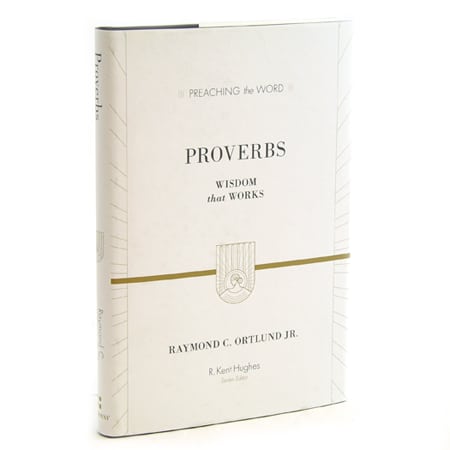⏱️ Estimated Reading Time: 5 min read
In my opinion, Proverbs is the one book of the Bible that people struggle to locate the most within the canon. We get a feel and a sense for where all the other books go, and why they are there. But when we come to Proverbs, oftentimes it is difficult to find its proper place and significance within Scripture. Most of us know it is chock full of one-liners and words of wisdom from Solomon, but how does this seeming haphazard collection of sayings impact us as Christians, and further, why should we spend time actually reading this book altogether?
Most people understand the need for a commentary on books such as Genesis or Mark that help us to get acquainted with the narrative. But a Proverbs commentary…what’s that about? And how would Proverbs point us to Jesus when it’s just a laundry list of sayings compiled into an extremely broad book? To tell you the truth, I feel that there is no one more cut out for the job of writing a commentary on Proverbs, and making it relevant and Christ-centered than Pastor Ray Ortlund.
Ortlund’s greatest strength in his writing and preaching style is that he is first and foremost a biblical theologian. While he champions exegesis and linguistics and history, it is his dedication to doing biblical theology that makes his work so compelling. Every story, every verse, is pointing to one overarching story. Proverbs, as Ortlund shows us in his volume for the Preaching the Word commentary series, is not a book that should be isolated in our understanding of the Bible. It is right in the thick of it, literally right in the middle of the text, and for good reason! Ortlund’s style in this particular commentary is primarily concerned with addressing the “What’s the point?” Such a point is significant because it speak to the apprehension people have with Proverbs, which is what makes this commentary so important. Ortlund is a master of making passages in Proverbs not only make sense but carry Christ-centered significance.
This focus is demonstrated through Ortlund’s outline for the commentary. After an introductory chapter on the significance of Proverbs, Ortlund takes thirteen chapters to walk through Proverbs 1–9 expositionally, verse-by-verse, leaving no verse untouched. Once he gets to the Proverbs of Solomon in Proverbs 10, Ortlund takes seven chapters to pinpoint seven issues topically, using key verses to address the topics of the tongue, humility, family, emotions, friendship, money, and life and death. Another helpful section of the book is where Ortlund includes an index of his sermon illustrations. We find these scattered throughout the book. This is a unique but very helpful section for a commentary.
Above all, the thing that makes Ortlund’s preaching and writing so helpful, as I always tell people, is his ability to combine being tenacious with being gracious. The two don’t seem to go hand in hand for most people, especially preachers, but Ortlund finds a way of walking that high-wire act with ease. When you hear about God from Ortlund’s perspective, you’re not going to walk away from it with a fluffy, carefree grandfather in mind, yet you will feel the love, compassion, and guidance of the Father every time as well. There is a seriousness to the Proverbs that Ortlund presents that makes it urgent. As he opens the book, “We are becoming the end of our journey, wise or foolish, and every moment takes us closer there” (15). Yet he never forgets to remind us that our hope should rest in Christ. “Wisdom is the grace of Christ beautifying our daily lives” (17).
My two favorite sections are “A Storm is Coming (Prov. 1:20-33)” and “The Tongue (Prov. 18:21),” although I found myself underlining in every chapter more and more as I read. These two particular chapters I think are extremely significant for our Christian culture today, along of course with passages such as the ones on sexuality (e.g. chapters 10 and 12). I would take the time to give you some of my favorite quotes from it, but I would rather you simply have the whole of it for yourself, as Ortlund does in his own Bible teaching.
There are lots of great Proverbs commentaries out there. Waltke, Hubbard, Kidner, Longman. Each has its strength. Ortlund’s strength is locating and magnifying Proverbs as a critical component of Scripture that is ultimately telling us the Gospel story like Matthew and Luke do. Wisdom That Works is a fitting title because the wisdom presented in this book and this particular commentary is not wisdom for cloud-level, unreachable thinking about God, but practical, transformative, real wisdom that manifests itself in reality. The book of Proverbs is pointing us to Christ-like wisdom; why do we delay to read it? I highly recommend this fascinating commentary to serve as a companion to in your study of the book of Proverbs.




